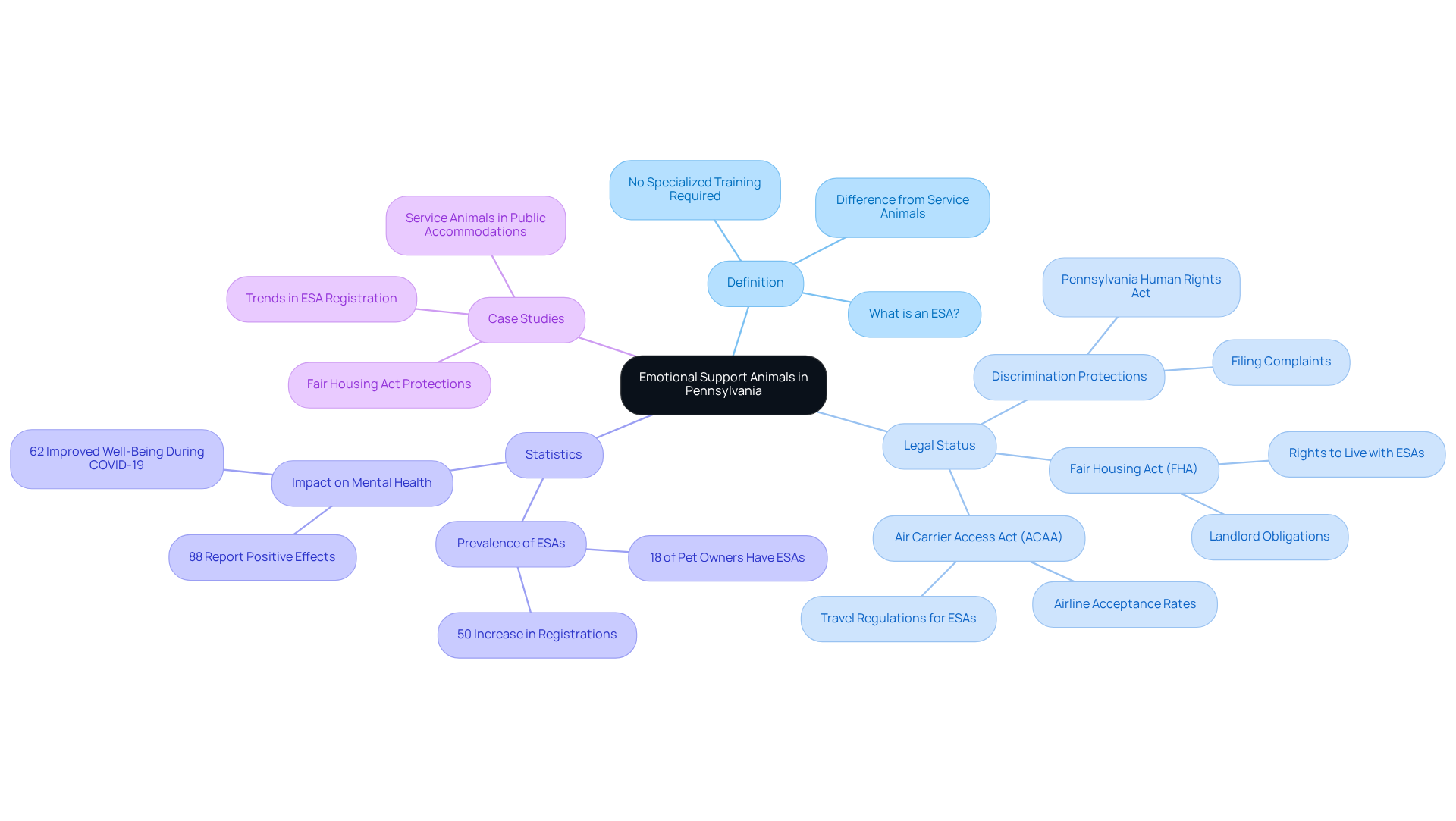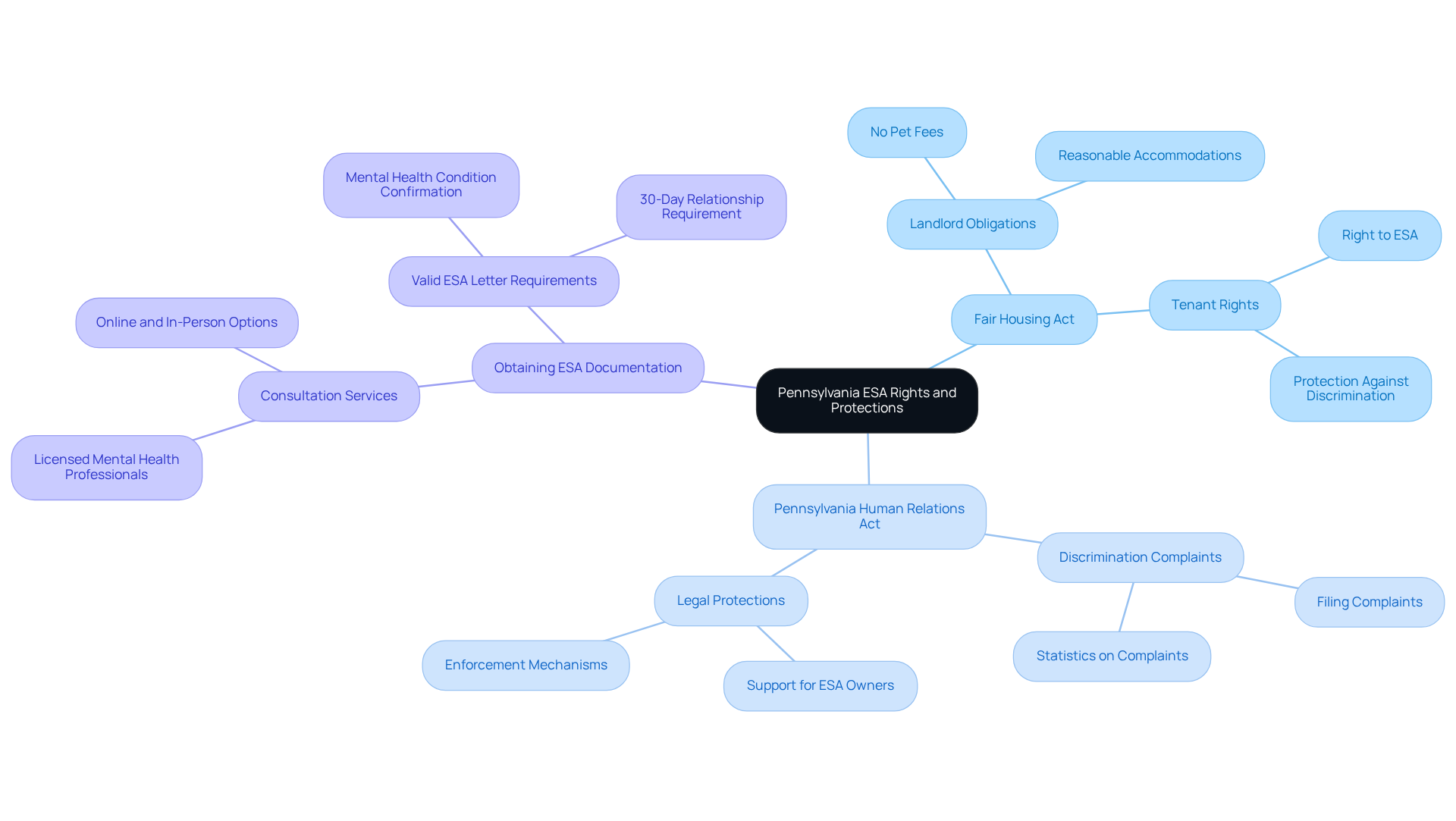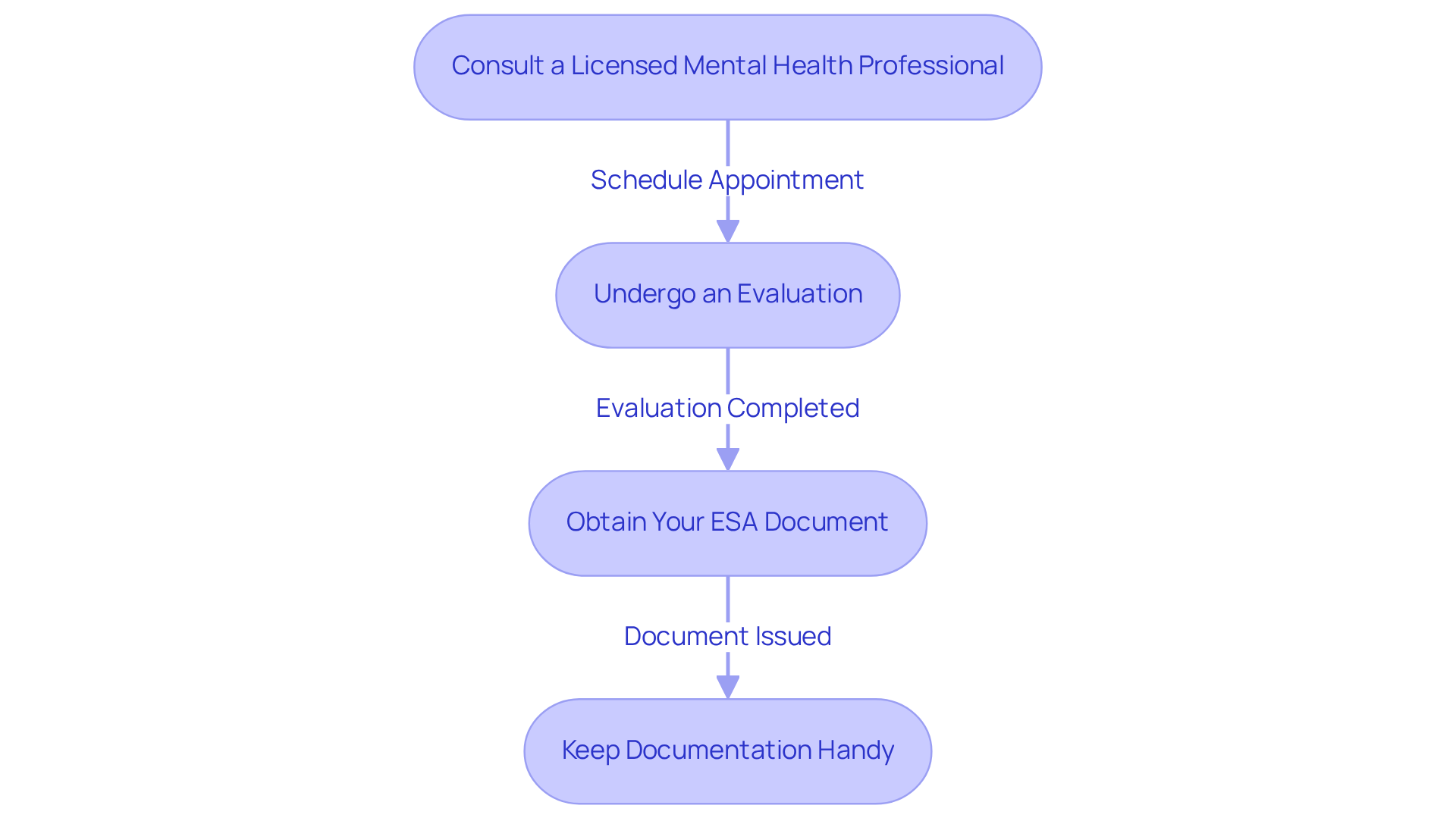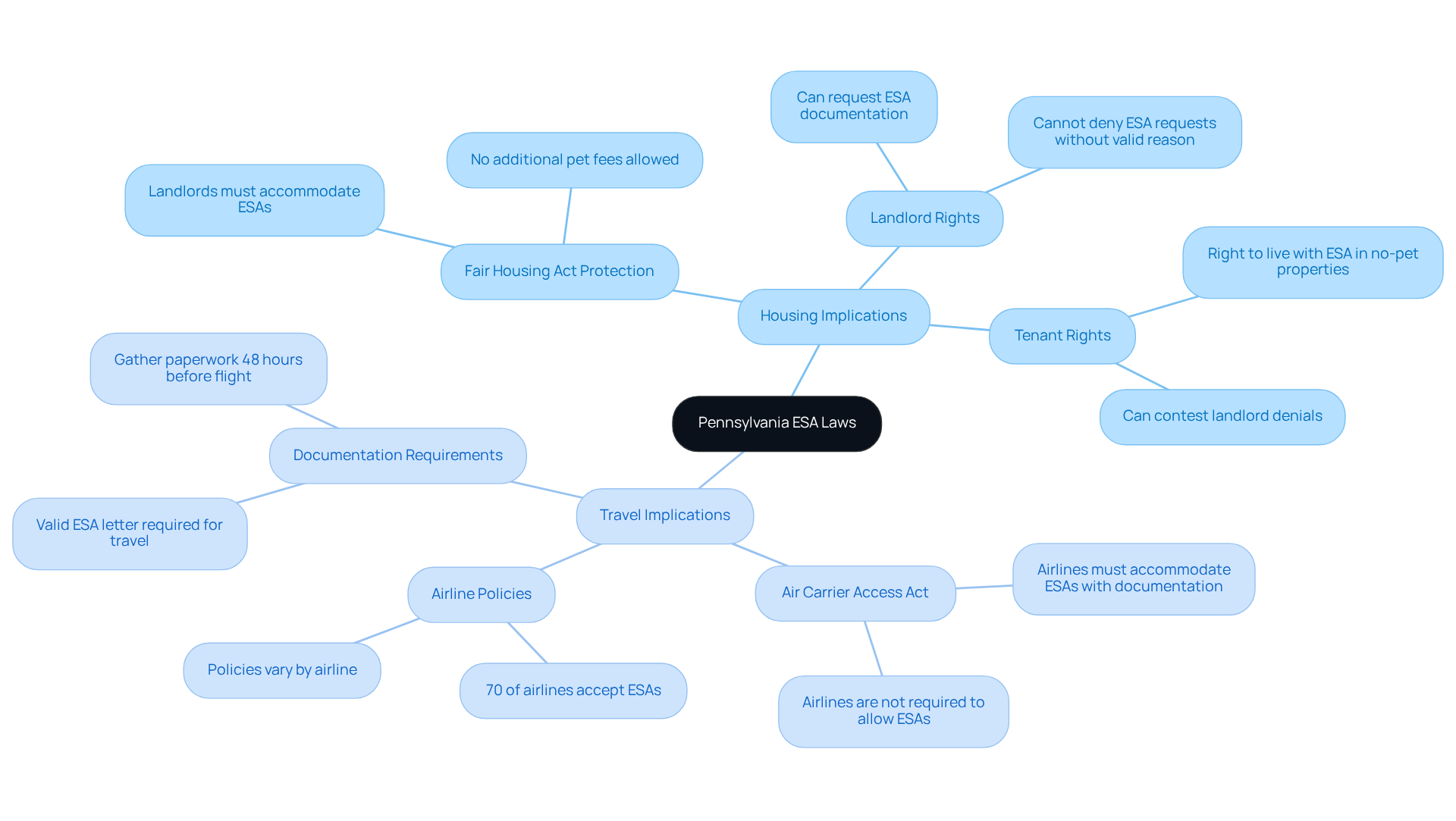

Navigating Pennsylvania ESA Laws: Rights, Process, and Implications
by Lena Park
Last updated: August 31, 2025
Verified and Approved by:
Angela Morris,
MSW, LCSW
Fact Checked

Overview
This article delves into the rights, processes, and implications of Emotional Support Animals (ESAs) under Pennsylvania law, addressing the heart of the matter: the emotional challenges faced by many individuals. It recognizes the struggles that come with mental health issues, such as anxiety or depression, which can often feel isolating and overwhelming. In these moments, the presence of an ESA can offer essential emotional support, acting as a comforting companion during difficult times.
Under the Fair Housing Act, ESAs are afforded protection, allowing individuals to live with their beloved companions in housing that typically restricts pets. This provision is a vital lifeline for those who rely on the calming presence of their ESAs. The article outlines the necessary steps to obtain a valid ESA letter from a licensed mental health professional, guiding readers through the process with compassion and clarity.
If you find yourself navigating these emotional waters, know that you are not alone. The support available through ESAs can be a transformative experience, providing not just companionship but also a sense of stability and comfort. Remember, the journey to securing an ESA letter is a step toward embracing the support you deserve.
Introduction
Navigating the complexities of emotional support animal (ESA) laws in Pennsylvania can be overwhelming, especially for those grappling with mental health challenges. The growing recognition of ESAs highlights an urgent need for clarity regarding the legal protections available to their owners. This article aims to explore the essential rights, processes, and implications surrounding Pennsylvania ESA laws, offering guidance on how individuals can secure their emotional support companions in housing and travel situations.
What struggles do ESA owners encounter when asserting their rights, and how can they find their way through this evolving legal landscape with confidence and support?
Define Emotional Support Animals and Their Legal Status in Pennsylvania
In Pennsylvania, an Emotional Support Creature (ESA) serves as a source of comfort and support for individuals navigating emotional or psychological challenges. Unlike assistance creatures, trained to perform specific tasks for those with disabilities, ESAs do not require specialized training and do not enjoy the same legal privileges and access to public spaces as service dogs.
The legal framework surrounding Pennsylvania ESA laws is largely influenced by the Fair Housing Act (FHA), which protects the rights of individuals with disabilities to live with their ESAs in environments that might typically restrict pets. To qualify as an ESA, individuals must secure a valid ESA letter from a licensed mental health professional, affirming their need for this vital support.
It’s heartening to note that recent trends reveal approximately 18% of pet owners in the U.S. depend on ESAs for emotional assistance, underscoring the increasing acknowledgment of their significance in mental health care. Moreover, case studies illustrate the FHA’s essential role in preventing discrimination against individuals with disabilities under Pennsylvania ESA laws, ensuring they can coexist with their emotional support animals without encountering unnecessary obstacles.
This growing recognition emphasizes the importance of emotional support in our lives and the compassionate solutions available to those in need.

Explore Rights and Protections for ESA Owners Under Pennsylvania Law
In Pennsylvania, the Pennsylvania ESA laws provide ESA owners with robust protections against housing discrimination, primarily under the Fair Housing Act (FHA). This federal law requires landlords to provide reasonable accommodations for tenants with ESAs, even in properties that enforce ‘no pets’ policies. As a result, landlords cannot deny a tenant’s request to keep an ESA based solely on such restrictions, nor can they impose additional pet fees or deposits. The Pennsylvania Human Relations Act further fortifies these protections under the Pennsylvania ESA laws, ensuring that individuals with disabilities are not subjected to discrimination due to their reliance on an ESA for emotional support.
Understanding Pennsylvania ESA laws is crucial for ESA owners, as these laws empower them to advocate for their needs in housing situations. Have you ever felt anxious when a landlord declines to accept a valid ESA document? If so, know that tenants can submit a complaint to the U.S. Department of Housing and Urban Development (HUD) or Pennsylvania’s Human Relations Commission. Real-life cases have shown the prevalence of discrimination, with disability-related complaints making up over 52% of fair housing grievances in 2023. This underscores the importance of knowing your legal rights and the necessary documentation, such as a valid ESA document from a licensed mental health professional, to ensure compliance with both federal laws and Pennsylvania ESA laws.
At Wellness Wag, we are here to simplify the process of acquiring valid ESA documents through personalized consultations with licensed medical professionals. After you submit the required forms, you will be connected with a licensed medical doctor for a thorough evaluation to assess your eligibility for an ESA. Upon confirmation, you’ll receive a professionally crafted ESA document recognized by law within 24 hours of your consultation. This service not only provides the essential documentation but also ensures that ESA owners are well-informed about their rights and protections under the law. We understand how important this support is for you and are dedicated to helping you navigate this journey with care.

Outline the Process for Obtaining an ESA Letter in Pennsylvania
If you’re seeking an ESA document in Pennsylvania, it’s important to approach this process with care and understanding of Pennsylvania ESA laws. Here are the steps to help you navigate this journey:
-
Consult a Licensed Mental Health Professional (LMHP): Begin by scheduling an appointment with a licensed therapist or psychiatrist who can thoughtfully evaluate your mental health needs. It’s essential that the LMHP is authorized in Pennsylvania and possesses the qualifications necessary to understand your unique situation.
-
Undergo an Evaluation: During your consultation, take the time to discuss your emotional or psychological challenges openly. Share how an ESA could provide the support you need. The LMHP will assess whether your condition aligns with the criteria outlined in the Diagnostic and Statistical Manual of Mental Disorders (DSM-5), ensuring you receive the right guidance.
-
Obtain Your ESA Document: If the LMHP determines that you would benefit from an ESA, they will provide you with a note on official stationery. This document will indicate your necessity for an ESA and must include the LMHP’s license number, type, date of issuance, and signature to ensure its validity.
-
Keep Documentation Handy: It’s a good practice to always have a copy of your ESA letter accessible for landlords or travel authorities when required. This ensures that you possess the essential documentation to support your rights as an ESA owner.
In Pennsylvania, the Pennsylvania ESA laws ensure that landlords cannot charge additional fees or deposits for ESAs, creating a more affordable living arrangement for you. Understanding the role of ESAs is vital, as they offer significant emotional support to individuals facing psychological or emotional challenges. While they may not have the same legal privileges as service dogs, their presence can be profoundly beneficial. Remember, you are not alone in this journey, and there is support available to help you thrive.

Discuss Housing and Travel Implications of ESA Laws in Pennsylvania
In Pennsylvania, many individuals face emotional challenges that can feel overwhelming. The implications of Pennsylvania ESA laws significantly impact both housing and travel, offering a beacon of hope. Under the Fair Housing Act (FHA), individuals with valid ESA letters are entitled to live with their emotional support companions in accommodations that usually limit pets, such as apartments and rental properties with ‘no pets’ regulations. This legal safeguard ensures that landlords cannot refuse tenants the ability to have their ESAs, nor can they charge extra fees for these beloved companions.
It’s essential to understand that emotional support animals differ from service dogs, which are trained to perform specific tasks for individuals with disabilities. Unlike service dogs, ESAs do not possess the same legal privileges and access to public areas as provided to service dogs under the ADA. This distinction is crucial for ESA owners, as navigating their rights can often feel daunting.
When it comes to travel, the Air Carrier Access Act (ACAA) mandates that airlines accommodate ESAs, provided passengers present the necessary documentation, including a valid ESA letter. However, travelers should reflect on their plans, as airlines may have specific policies regarding the types of creatures permitted on board. As of 2025, approximately 70% of airlines continue to accept emotional support creatures, reflecting a growing recognition of their significance in supporting mental health.
Real-life examples illustrate the effectiveness of Pennsylvania ESA laws: many individuals have successfully contested landlords’ denials of ESA requests by citing these laws along with protections under the FHA, ensuring they can live comfortably with their companions. Additionally, travelers are encouraged to verify their airline’s specific requirements and gather all necessary paperwork at least 48 hours before their flight to avoid disruptions. Furthermore, the Assistance and Service Animal Integrity Act provides a legal framework that combats fraudulent requests for ESA letters, ensuring that legitimate ESA owners are protected. Understanding Pennsylvania ESA laws empowers ESA owners to navigate their rights effectively, enabling them to enjoy the companionship of their animals in various aspects of life.

Conclusion
Understanding the intricacies of Pennsylvania’s Emotional Support Animal (ESA) laws is vital for individuals seeking the comfort and companionship that these animals provide. Many people face emotional challenges that can feel overwhelming, and the laws not only outline the rights of ESA owners but also delineate the processes involved in obtaining the necessary documentation. This ensures that those who rely on ESAs can live and travel without undue hindrance.
The article highlights several key points, including:
- The definition and legal status of ESAs
- The protections afforded to ESA owners under the Fair Housing Act
- The steps required to obtain a valid ESA letter
Having the right documentation is crucial, as it allows individuals to understand the legal framework that supports their coexistence with emotional support animals, particularly in housing situations where discrimination can occur. Have you ever felt the weight of being misunderstood or unsupported? Knowing your rights can empower you.
Ultimately, navigating Pennsylvania ESA laws is not just about understanding your rights; it is about fostering a supportive environment for those in need. As awareness of the significance of emotional support animals continues to grow, individuals are encouraged to advocate for their rights, seek the necessary documentation, and educate themselves on the protections available. By doing so, they can ensure a harmonious living situation and enjoy the many benefits that come from the companionship of their ESAs. Remember, you are not alone in this journey; support is available to help you thrive.
Frequently Asked Questions
What is an Emotional Support Animal (ESA) in Pennsylvania?
An Emotional Support Animal (ESA) in Pennsylvania is a creature that provides comfort and support to individuals dealing with emotional or psychological challenges. Unlike service animals, ESAs do not require specialized training.
How do ESAs differ from service animals?
ESAs differ from service animals in that they are not trained to perform specific tasks for individuals with disabilities and do not have the same legal privileges and access to public spaces as service dogs.
What legal protections do ESAs have in Pennsylvania?
In Pennsylvania, the legal framework for ESAs is influenced by the Fair Housing Act (FHA), which allows individuals with disabilities to live with their ESAs in housing that may otherwise restrict pets.
How can someone qualify for an ESA in Pennsylvania?
To qualify for an ESA in Pennsylvania, individuals must obtain a valid ESA letter from a licensed mental health professional, which confirms their need for the animal’s support.
What percentage of pet owners in the U.S. rely on ESAs for emotional support?
Approximately 18% of pet owners in the U.S. depend on Emotional Support Animals for emotional assistance.
How does the Fair Housing Act (FHA) protect individuals with ESAs in Pennsylvania?
The FHA plays a crucial role in preventing discrimination against individuals with disabilities in Pennsylvania, ensuring they can live with their emotional support animals without facing unnecessary barriers.
Certify Your Emotional Support Animal Today

Why You Can Rely on Us?
At Wellness Wag, we believe your pet deserves care rooted in both science and compassion. Each article is carefully researched, written in clear language for pet owners, and then reviewed by qualified professionals to ensure the information is evidence-based, current, and practical for real-life care. Our goal is to help you feel confident in making informed decisions about your pet’s health and well-being.
Reviewed by
Angela Morris, MSW, LCSW
Angela is a licensed clinical social worker with 20 years of experience in patient advocacy and community mental health. She has assisted numerous clients with ESA evaluations and brings a deep understanding of disability accommodations, ensuring that all information is accurate, supportive, and practical.

Written by :
Lena Park
Last Updated :
August 31, 2025












